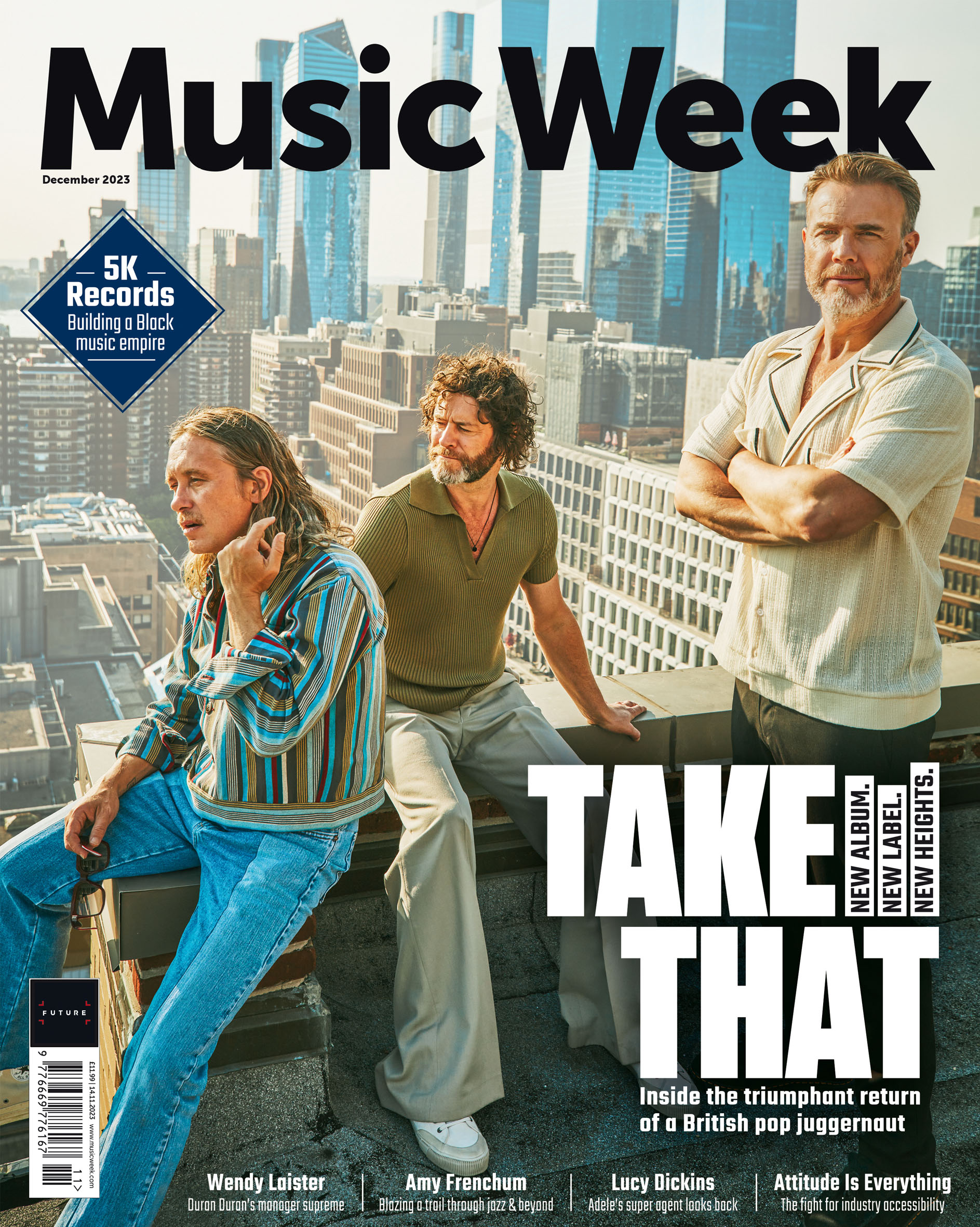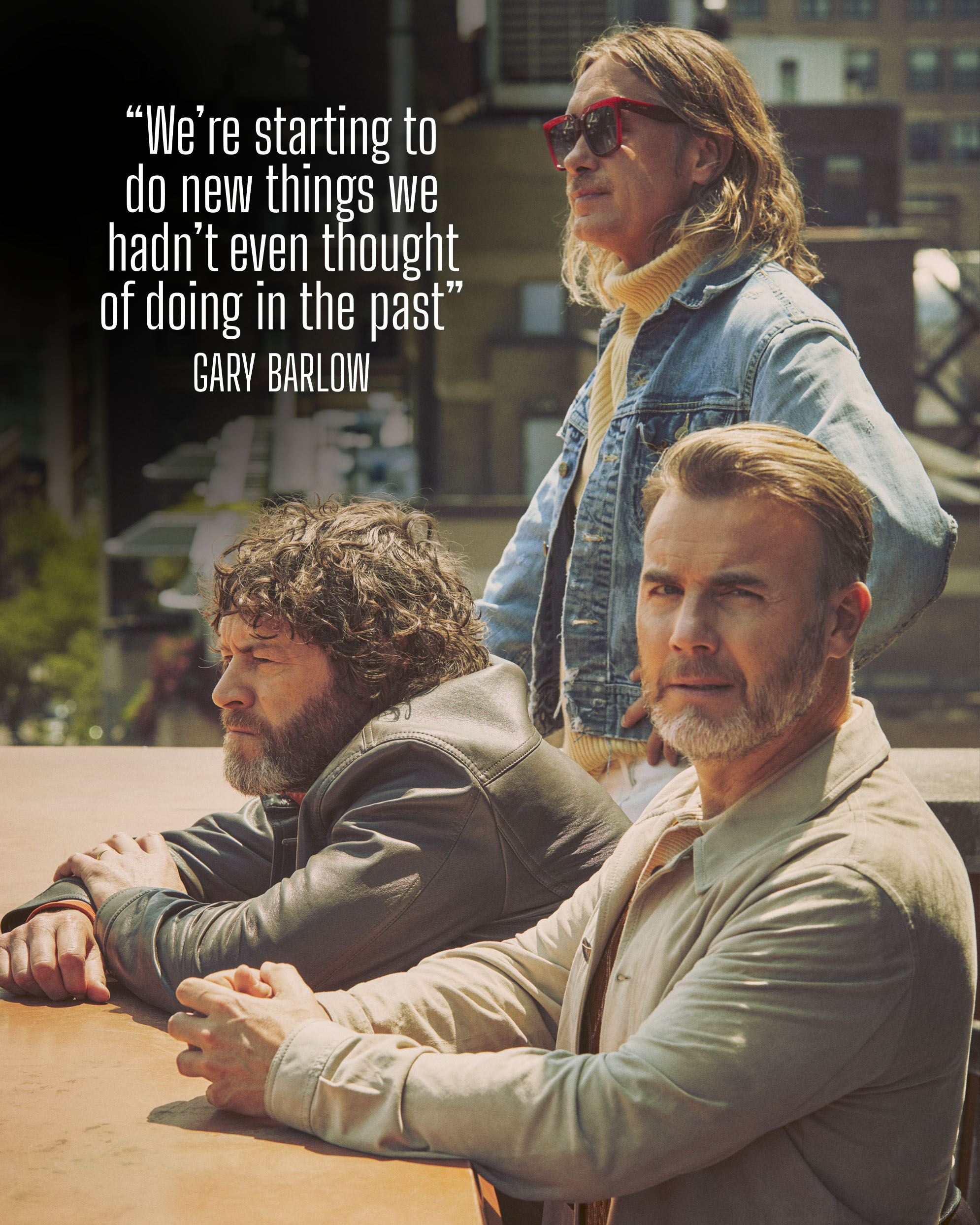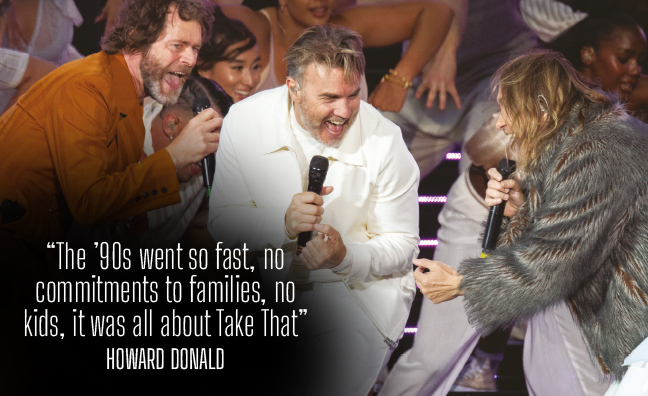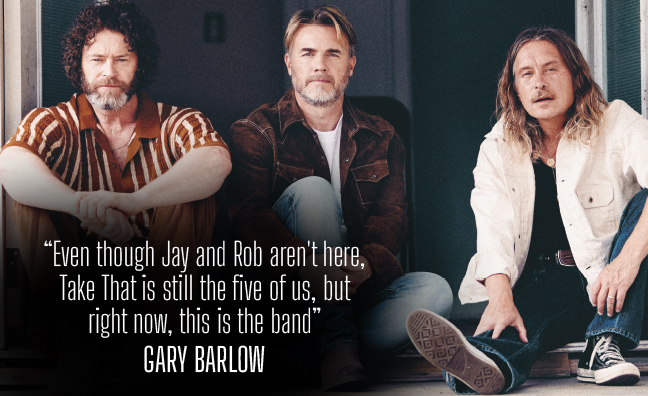Pop music simply wouldn’t be the same without Take That, and with the arrival of This Life, their first album of new material since 2017 smash Wonderland, they’re ready to push things forward once again. To mark the start of yet another fascinating chapter, Music Week meets Gary Barlow, Howard Donald and Mark Owen, manager Chris Dempsey, plus new label EMI, SJM and UTA, to talk industry changes, songwriting and why listening to the fans will always be the most important thing…
WORDS: NIALL DOHERTY
PHOTOS: GUY AROCH
When Take That embarked on their Greatest Hits tour in 2019 – a run of giant shows arranged to celebrate 30 years of Britain’s most successful boy band turned adult pop phenomenon – the trio felt a sense of something coming to a close. It was as if one era was ending and another beginning.
At the same time, Gary Barlow, Mark Owen and Howard Donald were feeling more and more at home as a three-piece. It had been four years since Jason Orange had departed the group and, with Robbie Williams returning to solo duties, the reduced line-up had taken some getting used to. But as they toured Odyssey, an album that saw Take That rework some of their best-known songs, being a trio felt right. The record sold more than 100,000 copies in week one and now has 463,517 sales, according to the Official Charts Company. This was a fresh start, they thought to themselves. Whatever they did next, it would be a clean slate.

It’s a sunny Friday morning in central London as the members of Take That are dropped off in separate cars with regulation blacked-out windows at the offices of their management company. Plonking themselves down onto a sofa (Barlow), another sofa (Donald) and into a slightly more formal chair by the door (Owen), there’s a crackle of excitement in the air. It’s the week that the band’s new era burst into life with the announcement of ninth studio album This Life, the first release from what is being referred to within the band’s team as “TT 3.0”. The school of thought goes that the ’90s were phase one and the 2006 comeback up until the 2019 Greatest Hits tour phase two. Due on November 24, This Life heralds the dawn of phase three.
It’s also Take That’s first album on a new label – they have moved within Universal from Polydor to EMI – and first collaboration with Grammy Award-winning producer Dave Cobb, one which has resulted in This Life’s vibrant Americana-tinged sound.
“We’ve not had a lot of new labels,” begins Barlow, enthusiastic at the prospect of mixing things up. “We came back in 2006, we had Polydor, that was a new label and to have a new label again has been an exciting process.”
The Universal connection remains strong, with chairman and CEO David Joseph a long-term friend and confidant.
“David was a young junior press officer when we joined BMG in ’92,” Barlow recalls. “We spent a lot of time with him in those years. But when we came back, he was our boss, as it were – if we were to have a boss, it’s probably him.”
Joseph has long been the person that Barlow asks about changes and shifts within the music industry, a member of Take That’s inner circle that he trusts implicitly.
“He tells me what’s changed,” says Barlow. “And of course, the one thing that hasn’t changed, which he always reminds me, is that good songs sung really well are still the way it all works. It’s important to take on all these bits of new information, but then it’s important for us to go back and do what we always do: sit and write music and try to get good performances on record.”
When it came to that side of things, they were pretty much left to get on with it by EMI co-presidents Rebecca Allen and Jo Charrington.
“They’ve been very patient with us, not meddled at all,” Barlow explains. “Jo just said, ‘When you’re ready, send me things.’”
It helped that one of the first things Charrington heard was an early version of lead single Windows and its strummed, autumnal guitar-pop went down a storm.
“For a label, it must be nice to hear a single early and know that’s the direction,” states Barlow. “I like that because we need to go off and make our own music. For years, we’ve not been in a situation where we’ve had an A&R person thrashing us going, ‘We need a single!’, we’ve always been the one to deliver that and they’ve helped with producers or features. We’re not at the point where we need someone telling us we’re not good enough, so it’s been a totally supportive environment so far.”
“We’re so proud to have Take That signed to EMI, they’re a pleasure to work with,” offers Charrington. “The music they have created over the past three decades touches and connects people in a very special way. To be part of that is an absolute honour.”
But what guidance and support can EMI give a group like that Take That?
“The brilliant thing about Take That is their desire to still lean into a label,” praises Rebecca Allen. “We had a very early kick-off meeting with Gary, Howard and Mark, and it was incredible to see their engagement in the room. They listened, and respected our ideas, whilst also leading with their own experience and insight. From that very first meeting, the tone was set for a brilliant and collaborative partnership.”
Charrington hails Windows as “just the most incredible song and soundscape”.
“When Gary played it to me and Thomas Haimovici [A&R] in the studio, I was absolutely blown away,” she recalls. “We’re really ambitious with this album, we want this to be another No.1, which would be their ninth, and we are aiming for it to be the fastest-selling album from a British artist this year.”
Chris Dempsey, the band’s manager at YMU, says the key to a Take That campaign is for everything to steer in the right direction. There are lots of moving parts.
“Their world is a big creative machine,” says Dempsey. “There are many partners, from EMI, who have been fantastic, to SJM, a long-time promoter and partner that has been with the band way longer than I have, and Simon Moran [MD] is such an integral part of the team. Then we’ve got new partners in UTA, and many other third parties, from DawBell to brand partners. Underpinning all of it is trying to realise the band’s ambition and the band’s vision, and translating that to everyone whilst making sure we’re inputting a bit of creativity and direction ourselves.”

When it came to recording This Life, Take That decided to switch up their normal way of writing. Usually, they’d get together in a room, sit around the piano or guitar and see where it took them. This time they headed off in different directions and worked on their compositions individually before coming back together to see what they had. That moment of unveiling their ideas was easier for some members of the band than it was for others.
“Gary and Mark are always writing anyway because they’ve done solo stuff as well, whereas I haven’t,” states Donald. “I thought, ‘I’ve gotta come up with something great,’ so I went off and did co-writes with people I felt comfortable with. We brought our stuff to the table, which was a very nerve-racking thing for me, where I’ve got to try and be prepared for criticism and I’m not very good at [taking] it. But luckily, I brought the right songs in. I always feel like the weakest writer out of the three of us.”
“I think it allowed you the time and space to get across what you wanted,” interjects Owen. “Sometimes when we’re all together, naturally everybody is talking over each other.”
“It’s very tricky to be in the room with three people and try to get everyone in one song,” adds Barlow. “By saying he’s the weakest, Howard is touching on confidence.”
Barlow turns to face Donald before continuing.
“If I was going to say anything about this record being different, it’s that this is the best version of you I’ve ever seen,” he says. “You brought the best songs I’ve ever heard you write.”
With the trio at the core of their songwriting set-up, the band who have had 12 No.1 singles are slightly baffled at the modern hits that feature a full football squad of people on the writing credits.
“It’s a very modern thing, that,” says Barlow, mulling it over. “I think it started in the hip-hop world where they’d have someone making beats, someone adding chords, then someone would bring in a verse from another session they’d done next door, with the same amount of team in there, so all of a sudden, you’ve got 20 names on it.”
“You get three big artists on one song as well,” opines Donald. “Collaborating to make the song bigger, as big as it can ever be.”
They took a more old-school route when it came to making This Life, heading to Nashville in early January (it was -2 degrees) to work with Dave Cobb, a Georgia native famed for his recordings with Chris Stapleton, Brandi Carlile and Sturgill Simpson.
“The producer was an important factor on this record,” says Owen. “We’ve worked with some of the best – John Shanks, Stuart Price, Mark Ralph – but I think for us on a new label, making a new record after all this time, it was quite important for us to feel like we were going to have a new sound and try to look for something new. We had a new A&R called Thomas Haimovici and he brought in a few names, and Dave was one of the names on his list.”
Entering the city’s legendary RCA Studio B, they could feel the history in the walls.
“There’s so much heritage in that place,” beams Owen. “From Elvis to Dolly Parton, Buddy Holly, the Everly Brothers. As soon as we got in there, Dave had set up a band. We hadn’t met them before and within an hour, we’d started recording the album.”
Owen says it was important that they went to Cobb rather than the other way round.
“It was his sound that we liked,” he explains. “It would’ve been a bit silly to say, ‘Oh, come and work with us in Notting Hill!’, so we went into that world.”
With sessions continuing at Cobb’s home studio in Savannah and finishing in New York, Barlow says it’s the hardest they’ve ever worked on their vocals.
“We’ve really gone to town,” he says. “We didn’t want music, backing vocals and then the lead vocalist; we wanted us on top of it all.”
That was prompted, he says, by Windows reminding him that above all else, Take That are “a vocal harmony group”.
“That’s what we are. We’re not a band where it’s bass, drums, guitar. That’s what we bring to our records. When we’d finished Windows, it’s like the Eagles or those groups from the late ’70s where it was all about vocal harmony. That’s what we always used to do, sitting in hotel rooms all those years ago. That was a really good pointer for the rest of the record.”
Anytime that Take That are on the cusp of releasing new music, Gary Barlow starts to feel on edge, that the bubble might be burst by some “smart-arse” online.
“Being a big, long successful act like us, it’s like having a bit of a target on your back,” he says. “We’ve got an amazing audience who stick with us and a lot of people see it and want to bring it down.”
Despite that, though, Barlow loves having the interaction with fans that social media brings. That sort of direct communication was something he pined for when the band first became huge, he says.
“If there was one thing we longed for in the ’90s, it was a connection to our audience beyond talking to a journalist or going through a newspaper or going through a TV show,” he explains. “That was the only way of getting to our audience, and now they’re in our hands.”
Social media does, however, present its own set of problems. It came to light earlier this year that Donald had liked a series of controversial tweets, including some critical of the trans community. He subsequently apologised, writing on Instagram: “I am really disappointed in myself and I am sorry for any hurt that I have caused.”
“I truly meant what I said when I was apologising,” he says today. “I truly meant my apology. I’m not that sort of person to purposely go out and upset anybody, it’s not me. If you asked anyone that knew me, they would tell you the same. I just want love, inclusivity and positivity, and that’s for every human being. That’s what I’m about.”
When talk turns to the burgeoning influence of TikTok on the modern music industry, Barlow says he simply sees it as a continuation of the connection they have been searching for.
“It’s like any of these things, when you boil them down, it’s people connecting with your music,” he reflects. “In the past, people used to take your music home and listen to it to relax, or listen to it on a Friday night. Nowadays, they’re making a dance routine to it. It’s not new in the way people are engaging with music, it’s just a new format of it.”
One thing that Barlow doesn’t get involved in is streaming data. He hasn’t a clue what Take That’s numbers are like on DSPs (“I couldn’t tell you,” he shrugs. “I think that’s distracting.”) He does, however, keep an eye on old-school metrics, and was elated to discover a few days before we meet that Take That had already clocked up a pre-order total that stands This Life in good stead for a suitably huge first week sales figure.
“I don’t watch streaming numbers,” Barlow smiles. “But that is a lovely thing to know.”

Another affirmation that Take That had lost none of their commercial appeal came in the shifting of 585,000 tickets for next year’s This Life On Tour, which will take in an array of arenas and stadiums across the UK.
“I don’t think there’s any clearer barometer of support or success than selling a ticket,” insists Chris Dempsey.
SJM’s Simon Moran, who was instrumental in the group re-forming in 2006 and has worked closely with them ever since as their British promoter, says it’s never a case of trying to beat what’s gone before – at 1.85 million tickets sold, their 2011 tour remains the highest-selling in UK history – but about being smart.
“It’s recognising the amazing shows they’ve put on, the spectaculars, how important the fans are, getting the pricing right,” states Moran. “We don’t take anything for granted and are granular about everything.”
It’s particularly pleasing to Moran that this tour will take in some venues and cities that haven’t regularly featured on Take That’s live schedules.
“We’ve got Nottingham Forest, Plymouth Argyle, Leeds Arena,” continues Moran. “They’ve certainly not played Leeds in the past 19 years.”
It’s not just in the UK that the band are adding new stop-offs. One of the things they mentioned to Dempsey as their thoughts turned to a new album and tour was that they wanted to get out and visit their international fanbase.
“They toured the world in the 1990s,” says Dempsey. “And after they re-formed they did a lot of touring and promo internationally but it’s got less and less over the years. We definitely have a vision to get out to some more markets.”
With that in mind, the team have brought UTA on board to work on the group’s global touring.
“Chris and the band have huge ambitions for their touring career and their work in other areas, as do we for them,” says agent Oliver Ward. “We thrive on working with creative artists and feel strongly that there are modern ways of representation that are applicable now more than ever. Signing Take That is the result of hard work and the company’s commitment to and investment in what we do internationally. We’re very proud to be working with them and for the wider industry to know that we’re here.”
“The process was a progressive and positive conversation that ended naturally with us working together,” adds agent James Wright.
“We want to go and sell some tickets in Europe, we want to go and sell some tickets further afield and get to see some fans maybe in Asia,” says Dempsey. “We want to get back out to Australia. Brazil is a really strong market. If you look at stats, socials, streaming, there’s lots of fans in Brazil and the band have never been there. We want to try to see if we can make these things work.”
Dempsey says the split with Polydor was “super-amicable” and the reason that the move to EMI felt right was because of where they were at and where the band were at. It all aligned.
“Becky had been in there about a year, Jo was coming in, it felt like, ‘Oh, this could be a really exciting and interesting new home,’” he says. “Becky and Jo had an awful lot to offer: ambition, energy and positivity. That was evident from the first meeting. Lucy Dann coming in from Polydor has been fantastic, too [Dann was promoted to MD at EMI in January of this year], she has that history with the band.”
“Polydor have done an incredible job over the past few years with Take That, which Lucy Dann led,” says Becky Allen. “So, when the opportunity was brought to us to work with the band, knowing Lucy was joining the company made it feel like perfect timing. The EMI label has been built on incredible and timeless artists, and with the energy and spirit within the label right now, we know we can build another brilliant chapter in their already storied career.”
Charrington is similarly positive, emphasising EMI’s desire to build on Take That’s legacy and move them forward, rather than just maintain the status quo. She brushes aside any notion that the band have not always received the kudos they deserve for their impact.
“They certainly get respect from us and the impact they have made on the British music industry is undeniable,” she affirms. “They performed for the King this year and played in front of 65,000 people at BST Hyde Park, they’ve had countless No.1 singles, have had a movie [Greatest Days] based on their music and their fans, they’ve won BRITs, Ivor Novellos… The list goes on. They’re a part of the cultural tapestry of the UK and I truly believe their artistry is being taken more seriously than ever.”
EMI marketing director Charlotte Birch says that live performance and direct-to-fan communication hold the key to their strategy.
“Live is a key driver of engagement, so having their headline set at BST Hyde Park and a super-intimate show at Koko gave us the power of harnessing the catalogue to keep the core fans engaged,” she says. “We also created a bespoke social broadcast channel, so we had an effective way of offering exclusive content and announcements, which resulted in a 95% open rate on messages in our pre-sale window.”
Brand partnerships will also come into play, but Dempsey says no deals have yet been finalised. For Odyssey, they teamed up with Suzuki.
“Suzuki was really good fun,” says Dempsey. “We’re always trying to think, firstly, ‘Is it a good fit?’ Ultimately, brands will work with you because they want an association with the band and our audience. We know the audience really well, so we’re always trying to think of them when we’re doing these deals.”
Gary Barlow’s mantra since Take That re-formed has been to enjoy every second. His biggest regret in the group is that he never got to savour success the first time round because he spent the whole time worrying, and he was determined to make sure he didn’t repeat the mistake.
“There’s not so much to worry about nowadays,” Barlow explains. “But I really try to enjoy it all for what it is. It’s meant to be fun. We’re in the entertainment industry.”
“You can look back now as an adult and as a family man and wish that we’d spoken to each other a lot more,” Donald agrees. “The ’90s went so fast, no commitments to families, no kids, it was all about Take That so we didn’t really speak to each other.”
His mind is suddenly cast back to the exit of Robbie Williams in 1995.
“You almost wish you could rewind and sit down and go, ‘What’s going on here, mate?’” he says. “But we were just too caught up in our egos.”
The contemplative silence that follows is broken by Mark Owen.
“Well, you were caught up in yours!” he says, letting rip one of his surprisingly booming laughs.
There has been much for Take That to enjoy since their re-formation but there have been hurdles to navigate, too.
The departure of Jason Orange in 2014 is top of the list.
“Going to a three, we were going, ‘How do we do this?’” Owen recalls.
The answer was keeping an eye on what the fans wanted them to do.
“We were watching social media to see if fans were interested in having three people as Take That and everyone was so positive,” Donald recounts.
They were told by everybody, their label and their team and everyone who works with them, that they should carry on, says Barlow, but until the diehards had their say, splitting up was a consideration.
“We were very much like, ‘No, we’re going to monitor this and really watch what the fans are saying,’” he remembers. “We really didn’t want to be coming back to everyone going, ‘What the hell is this?!’”
They kept their eye on it for two or three days and the decision was unanimous: the “Thatters” wanted their beloved Take That to keep going.
“It gave us the confidence to go off and finish that record,” continues Barlow. “If we hadn’t had [2014 single] These Days, we probably wouldn’t have done it that year. But we knew we had that song.”
Barlow sometimes feels as if Take That aren’t in the music industry but in some parallel realm of their own.
“We’re in our own world,” he reckons. “It just exists alongside the industry. I’m far more interested in what our audiences are saying, I like to know they are happy.”

Donald makes clear just how much Take That care about this.
“Sometimes, some of the fans are outside the hotels and you can’t help yourself but ask them, ‘Do you like the tour, what’s your favourite bit?’” he says. “And if someone says, ‘Oh, it’s not as good as the last one,’ it cuts you a little bit, as much as you don’t want it to. But that’s their honest opinion and it really, really does count.”
As for the harshest criticism Take That could get? Barlow says they’ve already heard it all.
“We lived through the ’90s and the early noughties where people having a go at one another was celebrated and it was entertainment,” he says. “I think there’s very little anyone could say to offend me now. And you know, what’s lovely is, I have never, ever, ever had anyone come up and say, ‘You’re rubbish.’ Everyone shakes your hand and goes, ‘Love the band, love the music.’ Always, wherever you go.”
And despite the fact that Take That have now existed in quite a variety of different eras and line-ups over the years, each iteration still feels part of the same whole to its members.
“Even though Jay and Rob aren’t here, Take That is the five of us still but, right now, this is the band,” says Barlow. “It’s a funny band, this, it’s like no other. They are still here in a way, those guys, because they’re so much part of the music we perform every night. We were a real trio by the time we hit Odyssey but this is the real three that’s come into the studio on this record. It’s definitely an album where we’ve moved up.”
Take That are keen to continue doing things they’ve never done before on this campaign. Barlow thinks they’ll remain a three-piece for the foreseeable future.
“I do,” he nods, before we part ways. “We’re in a good place at the moment, really good. I say that because I can see more music coming and everything is being led by the music. It’s not led by meetings or labels, it’s led by music and us and we’re already working on music for next year. It feels natural.”
Radio 2 In Concert with Take That is on Thursday November 23 and on BBC Sounds – and will be broadcast on BBC Two and BBC iPlayer on Saturday November 25 along with Reel Stories: That That








